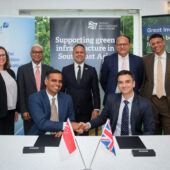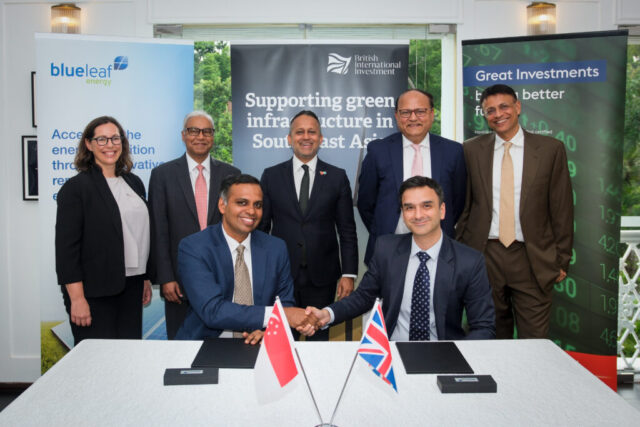The founder of Swedish fintech company Klarna set up the Norrsken Foundation because he saw that NGOs’ dependency on private donations was stifling innovation. The foundation’s CEO explains their raison d’etre.

“We want Norman Borlaug to be as famous as Kim Kardashian,” Erik Engellau-Nilsson says as he sums up the vision of Norrsken Foundation.
Agriculturalist Norman Borlaug was awarded the Nobel Peace Prize for revolutionising food production in Mexico and is often credited with saving over a billion people from starvation. “Yet, he is virtually unknown. We want to create new role models for today’s young generation,” Erik Engellau-Nilsson says.
Norrsken Foundation was set up in 2016 by Swedish fintech billionaire Niklas Adalberth, the founder of Swedish fintech company Klarna.
The idea behind the launch was to foster technology-driven start-ups with a clear impact vision. Erik Engellau-Nilsson was working closely with Niklas Adalberth as head of communications at Klarna.
“We realised there was more to life than e-commerce and started to engage with charities like Unicef, Save the Children and the Red Cross. We soon learned that the dependency on private donations makes NGOs less prone to take risks and try new technologies and innovations,” he says.
“We strongly believe that entrepreneurship is the key to solving some of society’s biggest challenges. This idea was the seed that later grew into the Norrsken Foundation.”
Impact investment ‘hype’
Interest in impact investing has skyrocketed in the last few years, and Scandinavia is no exception. “There is a real hype and an enormous interest in sustainable investment. The money never seems to run out.”
“Pension fund managers seek these types of businesses to invest in, but there are not enough entrepreneurs,” says Engellau-Nilsson.
“That is why we want to build an ecosystem of entrepreneurs and investors interested in this field, and Sweden is the perfect location. We are world-leading when it comes to purpose-driven entrepreneurs.” The shift is noticeable even among university students, Erik Engellau-Nilsson says.

“The most popular course at Stockholm School of Economics right now is sustainable financing. This indicates an enormous shift in attitude among students. They want to achieve something with their career, and not just make money.”
Combined co-working space and impact investment fund
Today, Norrsken Foundation is a combined co-working space and investment fund for start-ups with a clear impact focus. Niklas Adalberth has ploughed more than €1mn from his private wealth into the foundation.
In addition, Norrsken Venture Capital Fund has raised SEK1,2bn (€120mn) in impact investment capital. So far, the fund has a portfolio of 25 commercially viable companies with a clear impact focus, from reducing food waste to making the transport sector more sustainable.
Norrsken also funds ideas that have the potential to make an impact but do not necessarily have a business model, Erik Engellau-Nilsson says.
“If successful, these ideas can have a fundamental impact. And we are willing to take the risk, even though there is no commercial angle. One example is ABC Labs, a Covid-19 research lab at Karolinska Institute that was founded as a direct response to the Covid pandemic,” he says.
Another example is a platform for personal growth and development, a joint non-profit initiative based on research from Harvard University and Karolinska Institute. “It’s free to use and builds on the idea of digitalising offline interventions,” the CEO explains.
Teaming up with UNDP for an Impact Accelerator
This summer, Norrsken is launching a pre-seed accelerator in partnership with the United Nations Development Programme (UNDP). Twenty start-ups dedicated to reducing poverty, fighting climate change and improving food security will take part in an eight-week mentoring programme in Stockholm.
“We had 2,300 applications from 120 countries. Our selection criteria focussed less on the type of impact and more on the probability of turning the idea into a viable business.
“One of the companies has developed a way to produce cement without releasing carbon dioxide, a really promising concept. An equivalent of two Manhattans are being built every day and to reach the global emissions target, we have to find new ways to produce steel, cement and plastics,” Erik Engellau-Nilsson says.
Many opportunities in Africa
Next year, Norrsken is opening a hub for entrepreneurs in Rwanda’s capital Kigali. Erik Engellau-Nilsson says the East African hub will invite a broader set of entrepreneurs than the Stockholm equivalent.
“In Stockholm, our entrepreneurs must have a well-defined impact angle, whereas in Rwanda we want to contribute to building a sustainable business ecosystem.
“This means that we will have a broader definition of impact. For example, in Africa, we would support an idea like Spotify but that would not hold up in Sweden,” Erik Engellau-Nilsson says.
He says the African continent offers ample opportunity for impact investments.
“It’s the only part of the world where there is population growth. This, coupled with strong economic growth and a large proportion of the population still living in poverty, means investments can make a huge difference.”





